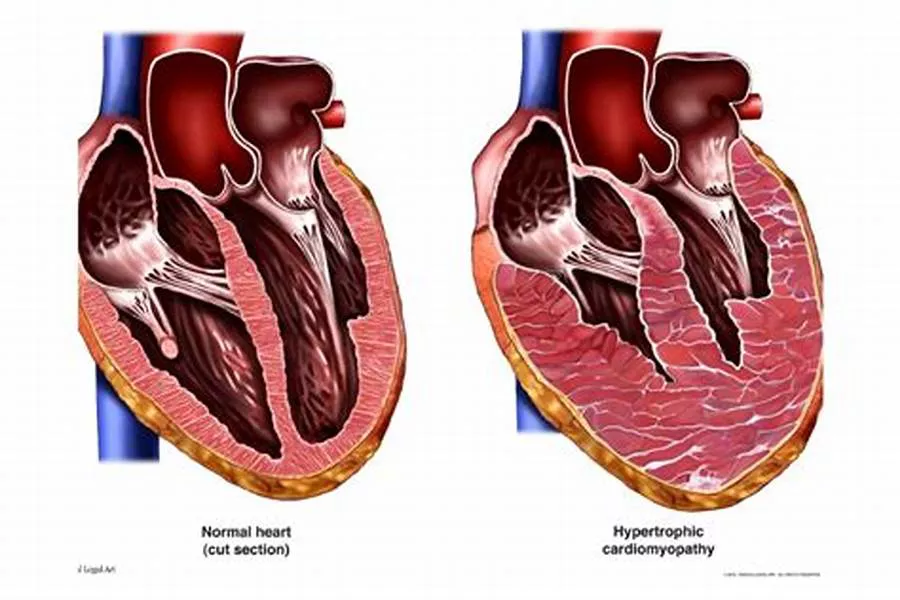Cardiomyopathy refers to diseases of the heart muscle that make it harder for the heart to pump blood to the rest of the body. This condition can lead to heart failure and other serious complications.
Understanding who is most at risk for cardiomyopathy is crucial for early detection and prevention. In this article, we will delve into the various risk factors associated with cardiomyopathy, examining genetic, lifestyle, and medical contributors to this complex condition.
Genetic Predisposition
Family History of Cardiomyopathy
One of the most significant risk factors for cardiomyopathy is a family history of the condition. Genetic mutations can be inherited that predispose individuals to various forms of cardiomyopathy, such as hypertrophic cardiomyopathy (HCM) and dilated cardiomyopathy (DCM). If close relatives have been diagnosed with cardiomyopathy, especially at a young age, the likelihood of other family members developing the condition increases.
Specific Genetic Mutations
Certain genetic mutations have been identified as direct causes of cardiomyopathy. For example, mutations in the MYH7 and MYBPC3 genes are commonly associated with hypertrophic cardiomyopathy. Genetic testing can help identify these mutations, allowing for early intervention and monitoring.
Lifestyle Factors
Alcohol and Drug Use
Chronic alcohol abuse is a well-known risk factor for developing dilated cardiomyopathy. Alcohol can be toxic to heart muscle cells, leading to their weakening and eventual failure. Similarly, the use of certain recreational drugs, such as cocaine and amphetamines, can cause cardiomyopathy by increasing the heart’s workload and causing damage to the heart muscle.
Unhealthy Diet And Obesity
Diet plays a significant role in heart health. Diets high in saturated fats, trans fats, cholesterol, and sodium can contribute to the development of cardiomyopathy by increasing the risk of hypertension, obesity, and diabetes, all of which are risk factors for heart disease. Obesity, in particular, increases the risk of developing cardiomyopathy as it places additional strain on the heart.
Physical Inactivity
A sedentary lifestyle can lead to a range of health issues, including cardiomyopathy. Regular physical activity helps maintain cardiovascular health by improving heart function and reducing the risk of hypertension and obesity. Lack of exercise can weaken the heart muscle, making it more susceptible to cardiomyopathy.
Medical Conditions
Hypertension
Chronic high blood pressure (hypertension) is a leading risk factor for cardiomyopathy. Hypertension forces the heart to work harder to pump blood, which can cause the heart muscle to thicken and stiffen, leading to hypertrophic cardiomyopathy. Over time, the increased workload can weaken the heart muscle, resulting in dilated cardiomyopathy.
Diabetes
Diabetes is closely linked to cardiovascular diseases, including cardiomyopathy. High blood sugar levels can damage blood vessels and heart muscle cells, increasing the risk of cardiomyopathy. Diabetic cardiomyopathy is a specific form of the disease that affects people with diabetes, characterized by changes in the heart muscle independent of coronary artery disease and hypertension.
Thyroid Disorders
Both hyperthyroidism and hypothyroidism can affect heart health. Hyperthyroidism, or an overactive thyroid, can lead to an increased heart rate and higher blood pressure, which can cause hypertrophic cardiomyopathy. Hypothyroidism, or an underactive thyroid, can result in decreased heart rate and weakened heart muscle, potentially leading to dilated cardiomyopathy.
Infections And Inflammatory Conditions
Viral Infections
Viral infections, such as those caused by Coxsackievirus, can lead to myocarditis, an inflammation of the heart muscle that can progress to dilated cardiomyopathy. The body’s immune response to the virus can cause damage to heart muscle cells, impairing the heart’s ability to pump effectively.
Autoimmune Diseases
Autoimmune diseases, such as lupus and rheumatoid arthritis, can cause inflammation that affects the heart muscle, leading to cardiomyopathy. In these conditions, the immune system mistakenly attacks healthy tissues, including the heart, causing chronic inflammation and damage.
Peripartum Cardiomyopathy
Pregnancy-Related Risk
Peripartum cardiomyopathy is a rare form of the disease that occurs during the last month of pregnancy or within five months after delivery. The exact cause is unknown, but it is believed to be related to the stress and physiological changes of pregnancy. Women who have had multiple pregnancies, are over the age of 30, or have a history of preeclampsia or hypertension during pregnancy are at higher risk.
Age And Gender
Age Factors
The risk of developing cardiomyopathy increases with age. As people age, their heart muscle naturally weakens, and the likelihood of developing conditions that contribute to cardiomyopathy,
such as hypertension and diabetes, also increases. While cardiomyopathy can occur at any age, older adults are more susceptible to the disease.
Gender Differences
Certain types of cardiomyopathy are more common in men than in women. For instance, dilated cardiomyopathy tends to be more prevalent in men, while women are at higher risk for developing peripartum cardiomyopathy. Hormonal differences and variations in heart structure and function between men and women contribute to these gender disparities.
Ethnicity
Ethnic Variations
Ethnicity can influence the risk of developing cardiomyopathy. For example, African Americans have a higher incidence of dilated cardiomyopathy compared to other ethnic groups. Genetic factors, socioeconomic status, access to healthcare, and differences in the prevalence of conditions like hypertension and diabetes among different ethnic groups all play a role in these disparities.
Conclusion
Cardiomyopathy is a complex condition with multiple risk factors spanning genetic, lifestyle, and medical domains.
Individuals with a family history of the disease, unhealthy lifestyle habits, or preexisting medical conditions are at higher risk. Additionally, factors such as age, gender, and ethnicity can influence susceptibility to cardiomyopathy. Understanding these risk factors is essential for early detection, prevention, and management of the disease. Regular medical check-ups, healthy lifestyle choices, and genetic counseling for those with a family history of cardiomyopathy can help mitigate the risk and improve outcomes for those affected by this serious heart condition.

